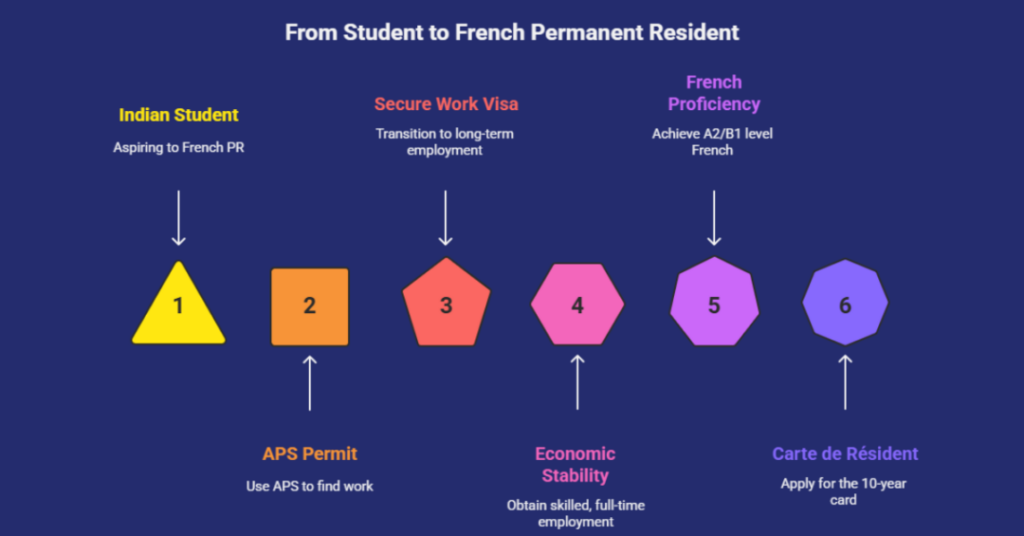13 July 2025
7 minutes read
How To Get A PR (Permanent Residency) In France After Study: A Guide For Indian Students?

Key Takeaways
- Know how to get PR in France after study with the right visa, job contract, and 5 years of continuous legal stay
- Shift from student visa to a qualifying work visa early to start your PR eligibility clock
- Learn French, file taxes, and integrate locally to avoid rejection during the PR process
97% of Indian students leave France after graduation. Not because they have fulfilled their dream of study abroad. But because they have to. Between figuring out the residence permit chaos and navigating a sea of legal terms you never signed up for, most simply give up. And let’s be honest, France isn’t exactly rolling out a red carpet for international students to stay, either.
Just studying in France doesn’t guarantee you a permanent residence permit or a pathway to French citizenship. You’ll need a long-stay visa, a valid residence permit post-study, a stable job contract (usually a CDI), and a lot of paperwork that doesn’t mess up mid-way. But if you’re strategic from day one—choosing the right university in France, using the APS (post-study work permit), and transitioning smartly to a work visa from student visa, you can apply for PR in France and actually build a life here.
This guide will show you how Indian students can crack the system—and stay in France legally and permanently.
How To Get A PR (Permanent Residency) in France As An Indian Student?
Permanent residency, often known as PR, is a highly sought-after status in France that allows individuals to live and work in the country indefinitely. For Indian students, this can be a dream come true, as it opens up numerous opportunities in one of the most culturally rich and economically vibrant countries in the world.

if you play your cards right from day one, understand the maze of the permit in France ecosystem, and stop assuming you’ll “figure it out later,” you can actually get a PR in France. Below are five things most students in France never get told—but these are what will determine whether you leave with a suitcase or a residency card.
1. Use the APS Permit Smartly—Don’t Waste That One-Year Window
Once your degree’s done, you’re granted an “Autorisation Provisoire de Séjour” (APS)—a temporary resident permit that gives you 12 months to find work. Most students waste it binge-watching Netflix, waiting for a miracle. Wrong move. Use this time to get a stable job contract (preferably CDI), network hard, and shift to a work visa in France before the APS expires. This one move defines whether you can legally stay in France for at least five years—one of the requirements for PR.
2. The 5-Year Rule Is Real—And It Starts From the Right Visa
To get a PR in France, you must have legally stayed in the country for at least five consecutive years. But not all years count. That student visa year? Often counted partially. Time on APS? Usually not. The real countdown starts when you switch to a long-term work visa or talent passport. So the earlier you get on the right permit in France, the sooner you become eligible to apply for permanent residence in France.
3. No PR Without Economic Stability—So Pick the Right Jobs in France
France doesn’t just care about whether you’re employed—they care about how you’re employed. To apply for PR, you need to prove long-term financial stability. That part-time bakery gig won’t cut it. We’re talking skilled jobs in France that match your degree—engineering, IT, data, architecture, business, etc. Make sure the contract is full-time and not just for a few months. It directly impacts your eligibility for permanent residence in France.
4. Language Matters More Than You Think—Apply for French Proficiency
Want to apply for French permanent residency? Then French can’t just be your café order language. You’ll need at least A2 level French (some prefectures demand B1). Start early. Join local classes or practice on the street—whatever it takes. Being fluent helps with integration, better jobs in France, and proves to the system that you’re not just a passerby but a potential long-term resident.
5. Know the PR Type You’re Going For—Not All Are Equal
France offers multiple kinds of resident permits, but the one you’re aiming for is the “Carte de Résident.” It’s valid for 10 years and is your golden ticket. But here’s the kicker: You must have stayed in France for at least five years under the right visa, show strong integration (read: language, employment, taxes), and not have a criminal record. Want to live in other European countries later? This card makes that journey easier. So aim for the right status, not just any legal stay.
What Is The Cost of Living In France?
Understanding the cost of living in France and addressing common questions can help you prepare better for your journey toward permanent residency. However, it is not that high but still it is good to consider the best places to study in France to avoid extra costs.
- Housing: Rent can vary significantly depending on the city. Consider sharing accommodation with fellow students to reduce costs.
- Food and Utilities: Dining out can be expensive, so learn to cook at home. Utility bills can also add up.
- Transportation: France has an efficient public transportation system, but costs can vary by location.
5 Things You Need To Take Care Of As An Indian Student Before Getting Permanent Residence In France
Most students find out too late that their dream to settle in France is stuck in a bureaucratic loop of “come back later”, “you’re not eligible yet”, or worse, “permit might get terminated.” Don’t be that person. If you really want to stay back in France, apply for a France permanent residence permit, and one day even get French citizenship, these five brutal realities are what you need to fix before anything else.
1. The Clock Starts Only with the Right Visa
Just because you arrived in France doesn’t mean your countdown to permanent residency in France has begun. Your France student visa doesn’t count fully toward the required five years of continuous residence.
Only once you move to a work visa in France, like the Talent Passport or Blue Card in France, does your real PR timer start. So if you’re serious about getting a France PR, transition quickly after your studies—don’t just float around on a temporary resident permit in France.
2. Your Degree Alone Won’t Save You—Work Stability Will
Look, there are pros and cons of studying in France. Yes, you have a degree from a French university, and that’s amazing. But if you think a master’s in France alone will help you apply for French permanent residency, you’re in for a shock. What matters more is whether you can work in France under a valid CDI contract and sustain yourself financially.
The French government expects PR applicants to have steady income and housing. Without these, your residence permit in France renewal—or even your France PR process—can get rejected.
3. Know When To Apply—and For What
Here’s where most foreign students mess up: they confuse residence permit renewals with PR. To apply for a PR, you must have legally resided in France under a visa that qualifies. The golden ticket is the France permanent residence card (Carte de Résident), but you must remain in France under valid status for five years.
That means no gaps, no overstays, and no visa switches that break continuity. Once you complete the time, you can apply for a France permanent residency visa that allows you to live here long-term—even apply for French citizenship later.
4. Language, Integration & Tax Filings—Yes, They Matter
PR in France isn’t just about ticking documents. You need to prove that you’ve integrated into society. That includes a minimum of A2 or B1 French proficiency (depending on prefecture), regular tax filings, and even a basic understanding of French values.
If you arrive in France and spend five years just working with fellow expats without engaging with local life, expect issues during the France PR for Indian students application process. Integration is non-negotiable if you want to live permanently in France.
5. Plan Your Finances: France Isn’t Cheap
Let’s not sugarcoat this—the cost of living in France can drain your soul and savings. Especially if you’re a fresh graduate in cities like Paris, Lyon, or Bordeaux. Before you even apply for a residence permit, make sure your income can cover rent, insurance, transport, and more. The prefecture will literally ask for your bank statements when you try to apply for a French permanent residency.
And remember: if you can’t support yourself, your permit might get terminated. Being broke is not an option if you plan to stay in the country long-term.
Conclusion
Obtaining permanent residency in France after study is an achievable goal for Indian students. By following the right steps, meeting prerequisites, and immersing yourself in French culture, you can turn your educational journey into a long-term adventure in one of Europe’s most captivating nations.
So, embark on this exciting path and explore the rich opportunities that France has to offer. Whether you’re studying art in Paris or engineering in Lyon, France welcomes you to pursue your dreams and build a bright future.
To get into a top French university, you need more than just good grades—you need a game plan. Ambitio’s AI-powered platform and expert consultants guide you through every step, from choosing the right university to securing study permits and work opportunities. No guesswork, no wasted time—just a clear, structured path to studying in France. If you’re ready to make studying in France a reality, Ambitio is your best bet.
FAQs
Q1: Can Indian students get PR in France after study?
Yes, Indian students can apply for permanent residency in France after completing their studies, provided they meet the necessary criteria.
Q2: How long does it take to get PR in France for Indian students?
The PR process in France can take several months to a few years, depending on individual circumstances and the region.
Q3: Can I work in France while applying for PR?
Yes, you can work in France on a post-graduate work permit while applying for PR, which can enhance your chances of obtaining PR.
Q4: Do I need to speak French to get PR in France?
French language proficiency is often required for PR. You may need to pass language tests to demonstrate your ability to integrate into French society.
Q5: What are the advantages of having PR in France for Indian students?
PR in France offers numerous benefits, including the freedom to live and work in France without the need for a visa, access to social services, and the opportunity to become a permanent resident of this beautiful country.

You can study at top universities worldwide!
Get expert tips and tricks to get into top universities with a free expert session.
Book Your Free 30-Minute Session Now! Book a call now




























